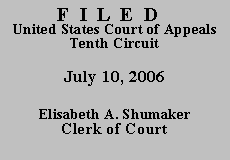 UNITED STATES COURT OF APPEALS
UNITED STATES COURT OF APPEALS
 UNITED STATES COURT OF APPEALS
UNITED STATES COURT OF APPEALS
TENTH CIRCUIT
| DELBERT McNEIL, JR.,
v. ERIC FRANKLIN, Warden, Respondent-Appellee. |
|
Before HENRY, BRISCOE, and O'BRIEN, Circuit Judges.
Delbert McNeil, Jr., a state prisoner proceeding pro se, seeks a Certificate of Appealability ("COA") to appeal the district court's denial of his petition for a writ of habeas corpus under 28 U.S.C. § 2254. The district court denied Mr. McNeil's petition as a result of (1) his procedural default of claims alleging an illegal arrest and seizure, and insufficient evidence to support his conviction, and (2) his failure to show cause and prejudice or a fundamental miscarriage of justice to overcome procedural default. Mr. McNeil also seeks to proceed in forma pauperis ("IFP") on appeal. We deny a COA, deny his request to proceed IFP, and dismiss the matter.
I. BACKGROUND
In June 2003, Mr. McNeil was charged with manufacturing methamphetamine, in violation of Okla. Stat. tit. 63, 2-401(G). Because Mr. McNeil was previously convicted of two or more felonies, he was charged under Oklahoma's sentence enhancement statute. A court-appointed attorney conducted pre-trial litigation, but the court granted Mr. McNeil the right to represent himself at his one-day jury trial. A jury found Mr. McNeil guilty and sentenced him to life in prison. With new court-appointed counsel, Mr. McNeil appealed his conviction and sentence as excessive, but the Oklahoma Court of Criminal Appeals ("OCCA") affirmed. On direct appeal, Mr. McNeil did not raise any of the claims that he now presents. In state post-conviction proceedings, Mr. McNeil did not allege ineffective assistance of appellate counsel for failure to raise these claims on direct appeal.(1)
Mr. McNeil subsequently filed a § 2254 petition for habeas relief in federal district court. He asserted that (1) he was arrested without probable cause; (2) an officer seized him in violation of the Fourteenth Amendment; and (3) there was insufficient evidence to support his conviction. In a thorough and well-reasoned report and recommendation, the magistrate judge concluded that Mr. McNeil procedurally defaulted on each claim and failed to overcome this procedural default by showing cause and prejudice or a fundamental miscarriage of justice. The district court adopted the recommendation and denied Mr. McNeil's petition for habeas relief.
II. DISCUSSION
Before a petitioner may proceed on an appeal from a denied § 2254 petition, he must receive a COA. 28 U.S.C. § 2253(c)(1). We may issue a COA "only if [Mr. McNeil] has made a substantial showing of the denial of a constitutional right." 28 U.S.C. § 2253(c)(2). Where a district court does not reach the merits of a § 2254 petition because the claim was procedurally defaulted, the petitioner seeking a COA must also demonstrate "that jurists of reason would find it debatable whether the district court was correct in its procedural ruling." Slack v. McDaniel, 529 U.S. 473, 484 (2000).
Here, reasonable jurists would not find the district court's procedural ruling debatable or wrong. All parties agree, and the record shows, that Mr. McNeil failed to raise any of the present claims on direct appeal. Those claims are now procedurally barred. Bousley v. United States, 523 U.S. 614, 621 (1998).
Procedurally defaulted claims may still be reviewed if the prisoner can show (1) cause for the default and actual prejudice, or (2) a fundamental miscarriage of justice defined as "actual innocen[ce]." Id. at 622. Mr. McNeil's only stated cause for default in the state courts is that his court-appointed attorney declined to raise these claims on direct appeal based on his confidence in their frivolity. Despite displeasure with appellate counsel, Mr. McNeil did not raise a claim of ineffective assistance of appellate counsel in his state post-conviction proceedings because he "never wished to attack or try to smear his appellate counsel in court." Rec. doc. 21, at 4 (Petitioner's Response to Attorney General's Response on Habeas Corpus, filed Nov. 2, 2005).
Likewise, Mr. McNeil fails to offer any evidence of a fundamental miscarriage of justice in the form of a "'colorable showing of factual innocence.'" Steele v. Young, 11 F.3d 1518, 1522 (10th Cir. 1993) (quoting Herrera v. Collins, 506 U.S. 390, 404 (1993)). Mr. McNeil's claims skirt actual, factual innocence and instead center on a lack of probable cause for his arrest. The record, however, belies the asserted lack of probable cause and illustrates the difficulty Mr. McNeil experiences in producing a "colorable showing of factual innocence." Id. The strong, distinctive smell of ether first attracted law enforcement to Mr. McNeil's home. Upon answering the door and being asked if he was "cooking dope," Mr. McNeil replied that he was not cooking methamphetamine; he was "just powdering it out." Rec. doc. 22, at 8-9 (Report and Recommendation, filed Nov. 29, 2005) (quoting OCCA Response, Ex. 2). Mr. McNeil provided written permission for the search of his home and helped the officers identify several containers of methamphetamine. Numerous tools and ingredients used to produce methamphetamine were also discovered in the search. Rec. doc. 13, ex. 3, at 4-5 (Aple's OCCA Br.). No reasonable jurist would suspect a miscarriage of justice based on actual, factual innocence.
III. CONCLUSION
Because Mr. McNeil did not show cause and prejudice or a fundamental miscarriage of justice, the district court properly concluded that it could not review his procedurally-defaulted claims. Reasonable jurists would not find these procedural rulings debatable or wrong. Accordingly, we DENY Mr. McNeil's petition for a COA, DENY his request to proceed IFP, and DISMISS the matter.
Entered for the Court,
Robert H. Henry
United States Circuit Judge
1.In 2004, the state district court reduced Mr. McNeil's sentence to 21 years' imprisonment.